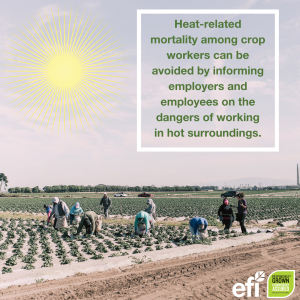 Farm labor is critical for putting food on our tables throughout the country. As summer hits full force, many agricultural workers who labor outside are at risk of heat stress.
Farm labor is critical for putting food on our tables throughout the country. As summer hits full force, many agricultural workers who labor outside are at risk of heat stress.
According to the Centers for Disease Control and Prevention, farmworkers who perform outside are exposed to hot and humid conditions at a rate 20 times higher than the general population of the United States, placing them at risk of heat-related illness or death. In 2016, 417 farmers and farm laborers died due to a work-related illness, a fatality rate of 21.4 per 100,000 employees.
Agricultural work is hazardous due to the heat and exposure to the sun, in addition to physically demanding labor and dangerous machinery. Heat-related symptoms such as nausea, dizziness, heat exhaustion, heat stroke, dehydration, and even death can occur when farm laborers work all day in the sun without appropriate hydration or shade breaks.
Agricultural employers can reduce heat-related illness by implementing heat stress management measures such as training field supervisors and employees on preventing, recognizing, and treating heat illness. Employers also need to encourage proper hydration, establish work/rest schedules appropriate for current heat indices, and provide quick medical assistance to employees who show indicators of heat illness. Employers and employees should be aware of signs of heat illness in themselves and coworkers and be prepared to provide and seek medical assistance if necessary.
Equitable Food Initiative certified farms set criteria for labor practices and food safety to generate healthier and safer working conditions to enhance agriculture and benefit future farmers. Farmworkers make it possible for you to enjoy fresh produce at a summer picnic. Buy from farms that protect their workers from rising summer temperatures to show your support for farmworkers laboring in the heat.
Written By: Tia Hill, Digital Media, and Communications Intern, Equitable Food Initiative

